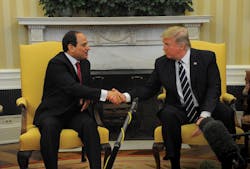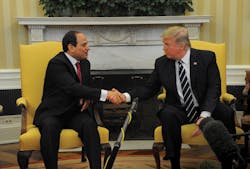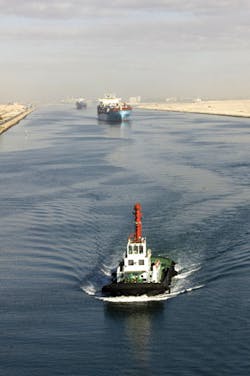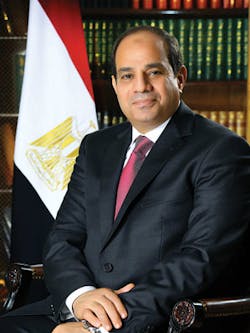Egypt luring foreign investment
President El Sisi wants to unlock the potential in his country's energy sector
EDITOR'S NOTE: The Focus Reports editorial team recently interviewed President Abdel Fattah El Sisi of the Arab Republic of Egypt in Cairo. Egypt has implemented a series of reforms aimed at reducing the budget deficit, creating jobs, and attracting foreign investment. The President has emphasized the importance of upgrading his country's energy sector.
OIL & GAS FINANCIAL JOURNAL: January 25th marked the sixth year of strong street manifestations, a day that changed the course of Egypt's contemporary history. As the elected President of Egypt, today, how would you define the moment that Egypt is witnessing institutionally?
PRESIDENT EL SISI: After the June 30, 2013 revolution, which called for the rectification of the transitional path that began with the 25 January Revolution, a political roadmap was agreed upon by national stakeholders to return Egypt to a sound democratic path. The three milestones of the "Roadmap for the Future" included endorsing a new constitution for Egypt, holding presidential elections, and holding parliamentary elections.
We successfully endorsed a new constitution that was approved by an overwhelming majority in January 2014. It encompasses unprecedented clauses in terms of enhancing the rule of law and democracy, as well as enforcing the principle of separation of powers. It also guarantees equality before the law and that citizenship is the basis by which the State interacts with the people.
In May 2014, Egypt accomplished the second milestone with the completion of presidential elections, and in 2015 the House of Representatives was elected to undertake its legislative and oversight role.
Egypt is keen on entrenching the values of democracy and human rights and upholding the rule of law. The rule of law based on justice and equality is a priority to the Egyptian government with a full commitment to the independence of the judiciary and to preventing any attempts to influence its rulings or interfere in its affairs.
With the completion of the roadmap, and with the presence of other solid, well-established institutions such as the judiciary, the military, the foreign service, and others, the structure of a new modern Egypt is almost completed. The focus at this turning point of Egypt's history is to restore the functionality of the Egyptian economy through an extensive agenda for economic and social reforms, coupled with the ongoing political reforms.
OGFJ: In an interview you gave about two years ago, you said that the people on the streets in 2011 were protesting to ensure that the command of their country did not become a "hereditary" issue. But today, they wanted their leaders to deliver housing, jobs, and a decent life. What economic reforms and key sectors are needed in order to secure a more prosperous future for Egyptians?
PRESIDENT EL SISI: When the Egyptian people took to the streets in 2011, they had specific demands for change. They wanted better opportunities, a fairer distribution of wealth, and a decent quality of living. The protests were not merely politically charged but were also driven by aspirations for better economic and social conditions. When they realized that their revolution was hijacked by a group that had failed to fulfill their aspirations, they went back to the streets in June 2013 to restore their right to determine their future.
The past six years have been overwhelmingly challenging at all levels. We were faced with an ailing economy that had inherited chronic imbalances, coupled with a drastic fall in foreign exchange reserves and foreign direct investment, as a result of political instability. This had to be immediately addressed to restore confidence in the Egyptian economy. The government adopted measures to revive the economy and to address budget and structural imbalances through the implementation of a homegrown economic reform program as well as "Egypt's Vision 2030" for sustainable development.
The reform program, which included severe measures to cut down subsidies, rationalize expenditure ,and float the currency, paved the way for the IMF to approve a $12 billion loan to support Egypt's economic reform program and to restore international confidence in the economy. This will encourage foreign investment and create more business and jobs, especially for the youth.
We have improved the infrastructure by upgrading the road network and addressed longstanding energy shortages. The New Suez Canal was completed as part of a more ambitious project, the Suez Canal Area Development Project, to establish it as a major logistics hub and to enhance Egypt's trade position. Our development endeavors also included the reclamation of 1.5 million acres of a bigger project to improve Egypt's agriculture and to create jobs. Providing adequate housing units for the middle and limited income brackets has been a key priority. Our development plan targets all parts of Egypt, some of which have been marginalized in the past, by constructing new integrated cities to deliver better services. In parallel, we are also working on improving our social safety nets to mitigate the impact of some of the harsh economic decisions on the more vulnerable groups.
These projects have created thousands of direct and indirect jobs. In addition, the government supports small and medium-sized enterprises by allocating 200 billion Egyptian pounds to help the youth establish projects and offer them assistance. Creating better social and economic conditions is an integral part of our comprehensive strategy to combat both extremism and terrorism.
There is much more work ahead of us before we realize our development goals. Our progress is nevertheless significant in light of the turbulent regional situation and our fierce battle against terrorism.
OGFJ: What role can private foreign investment play to ensure a positive outcome? Given that investor confidence has been deeply shaken in recent years, what safeguards are being put in place to reassure investors about the security of their assets?
PRESIDENT EL SISI: One of the main reasons that led to a slowdown in the economy was a decline of foreign investment due to political instability following the January 25 revolution. FDI reached its lowest level in 2011 and slowly began to improve in the following years when security and stability were restored, particularly with the completion of the "Roadmap for the Future." In 2015, FDI reached $6.8 billion and we are working to further increase this figure. Security was a major concern for foreign investors that we are seriously addressing in order to provide a safe and conducive climate for business and investment. In spite of the ferocious battle we are fighting against terrorism, we are capitalizing on every single opportunity to ensure that Egypt is a safe destination for foreign investment.
I also make it a priority to explain developments in Egypt and outline the potential it has during my foreign visits. Various international companies have shown keen interest to expand the size and scope of their business activities following a series of legislative and economic amendments to create a business-friendly environment. This includes the adoption of a unified investment law and other measures to streamline bureaucracy and settle investors' disputes swiftly. There is also emphasis on combating corruption by strengthening the role of regulatory bodies, namely the Administrative Control Authority. This reinforces the rule of law and reassures investors that their rights are protected. I believe that considerable progress has been made particularly in the past two years and companies have decided to increase their investment and scope of activities, which consequently help create more jobs.
OGFJ: Energy reform has been pinned as one of the cornerstones of your economic policies. Could you explain why this sector has been identified as a priority? What is your roadmap for unlocking the potential that Egypt's energy sector offers and for collaborating with other partners in this field?
PRESIDENT EL SISI: Energy is a crucial catalyst to realize sustainable development. It is therefore that reforming this vital sector is part of upgrading Egypt's overall infrastructure to meet growing consumption and development requirements. We are working on several tracks that include diversifying our energy sources. Egypt has set a national energy strategy aimed at increasing the contribution of renewable energy to its energy mix to 22% by 2020. We are also collaborating with Russia's Rosatom to construct the Dabaa nuclear power plant. Part of Egypt's sustainable development plan is making the best use of domestic energy sources. The Ministry of Energy and Renewable Energy has been working on enhancing power grids and constructing power plants across Egypt to increase production with both international and Egyptian investments in this sector. This includes a partnership with Siemens AG, which has partnered with local companies to build three new power plants. The first phase was already launched during Chancellor Merkel's visit to Egypt in March. These efforts have enabled Egypt to advance to 88th place from its previous position at 144th in electricity production, according to the World Bank's 2017 Doing Business report.
Cutting down energy subsidies was inevitable to address the budget deficit and to make sure that the right beneficiaries received subsidies. The recent gas discoveries in the Mediterranean Sea, particularly the Zohr field, and ongoing exploration are also major leaps that are set to help secure Egypt's energy needs and to place it as a regional oil and gas hub. It is noteworthy that these discoveries will extend to benefit other energy consumers in Europe as well. Egypt is embarking on various infrastructure projects in order to support these discoveries. These projects are meant to unleash Egypt's potential, along with its large and competent pool of workers, technical expertise and strategic location, and to collaborate with neighboring countries in this vital sector. This will eventually lead to a win-win situation.
OGFJ: Buoyed by the recent discovery of the supergiant gas field Zohr and with key infrastructure like the Suez Canal, Egypt is eager to become the regional energy hub. What role can Egypt play within the Mediterranean energy arena?
PRESIDENT EL SISI: Recent discoveries in the Eastern Mediterranean, between 2009 and 2011, position the region to become the next location for a global natural gas trading hub. Cooperation among the regional oil and gas players, producers and consumers, is critical to optimize the benefit from the region's resources and to achieve energy security. Egypt has always been a promising hub for energy transit, through the operation of two strategic energy routes in the region, the Suez Canal and the Suez Mediterranean (SUMED) pipeline. It has the potential to be a main actor in shaping the landscape in the EastMed region, given its massive network of infrastructure and facilities, part of which is currently being developed, as well as its important geographic location, human resources, and technical expertise.
Egypt's Ministry of Petroleum embarked on the development of a comprehensive modernization strategy that is set to become a new milestone in the overhaul of this sector. Based on six major initiatives, the Modernization Program is designed to unlock all the potential the country has and ultimately turn it into a regional oil and gas hub within the next five years. The key component of this transformation program is to address the inefficiencies in the sector and turn it into an attractive, competitive, and business-oriented industry. Other critical aspects are structure reform, upgrading the performance of the upstream sector, including introducing new technologies, and capacity building.
Other measures undertaken by the government of Egypt include the establishment of the Gas Regulatory Affairs division and finalizing a new gas law, which will all enhance investors' and traders' confidence.
Despite the challenges and instability in the world oil markets, Egypt successfully concluded agreements and partnerships with major international oil and gas companies. Egypt was able to secure committed investments of $30 billion during the next three to four years in three major upstream projects, namely: Zohr, North Alex, and Atoll. Egyptian-Cypriot cooperation is a model for regional cooperation in this field. Cooperation with Africa is also promising, given the continent's growing demand for oil and gas for its economic growth and development endeavors.
OGFJ: You recently visited the United States and met with US President Donald Trump. The visit was seen as ushering in a new phase in Egyptian-American relations under the new American administration. How do you expect this warmth in relations to impact the Egyptian-American strategic partnership?
PRESIDENT EL SISI: Since the June 30 revolution, Egypt's policy has been based on a balanced and serious engagement with various countries including the United States. President Trump and I share a strong commitment to enhancing the strategic relations between Egypt and the US. This was evident during our meeting at the White House in April, where we confirmed that our partnership is vital to advance bilateral ties and to promote peace and stability in the Middle East.
Mr. Trump appreciates and supports Egypt's efforts to combat terrorism and extremism, which is related to most of the conflicts in the region. There is a mutual understanding that Egypt and the US face a common enemy and therefore need to work closely to combat terrorism and extremism.
President Trump has reiterated his commitment to the longstanding and steadfast relations that bind Egypt and the US. We are both keen on strengthening bilateral relations, further advancing cooperation, and enhancing consultation and coordination so as to reinvigorate relations across various areas and in order to be able to address challenges in the Middle East, where several countries are mired in conflicts threatening their very existence, unless immediate political solutions were reached.
Egyptian-US relations are robust and cover a wide range of cooperation fields. The current regional and international challenges require enhancing frameworks of consultation between the two countries, given the positive impact this will have on their national security. Egypt is key to security and stability in the region, and cooperation with the US is critical to confront the common challenges, primarily the growing threat of terrorism.




